Spirit of innovation in distilling remains strong
This article contains affiliate links. We may earn a small commission on items purchased through this article, but that does not affect our editorial judgement.


The Scottish distilling industry is continually evolving, belying its traditional image with the introduction of ever more innovative techniques – and sustainable solutions are now firmly to the fore as companies place increasing focus on their green credentials.
• READ MORE: Whisky news
With the Worldwide Distilled Spirits Conference just ending in Glasgow, it’s the perfect time to analyse what our indigenous, globally-famous industry is doing in order to innovate and keep it at the forefront of the distilling industry worldwide.
Advertisement
Hide AdAdvertisement
Hide AdWe’ve always been a nation of adept inventors – from the tarmac we all drive on, to the telephone, television and much more – but right now, distillers are a modern equivalent, particularly against the backdrop of a major rise in international whisky demand that’s seen connoisseurs looking for ever more unusual and interesting flavours.
As we all know, Scots have been at the cutting edge in this area for centuries. Chief among our country’s leading proponents was arguably Robert Stein, dubbed “The Henry Ford of the Whisky Industry”.
In 1826, he patented a revolutionary type of still that would fundamentally change the course of the industry. Stein invented a method of continuous distillation, allowing spirit to be produced much faster and more efficiently than previously – in fact, it resulted in a 30-fold increase, allowing Stein to produce 150,000 gallons a year compared to the 5,000 gallons of a large pot still distillery.
Two centuries on, people don’t tend to think of modern Scottish distillers as innovators, believing that they favour more of a classical approach – and they’re right to an extent. Distillers are often trading on old techniques that harness the heritage and distinct localised character of their products, which is what consumers want to see.
However, it would be a mistake to suggest that the example of Stein and his brethren hasn’t been followed across the last 200 years. With over 100 active malt whisky distilleries, and that number set to swell, Scotland is still breaking the mould and reinventing the notion of what’s possible with ever-more sustainable solutions.
Behind the traditional façade, there are now major efficiencies and carbon reductions being realised, in turn ensuring that our distillers remain one step ahead through technical advances which have improved product consistency while reducing cost.
Scotland’s whisky waste by-products market is alone estimated to be worth some £140 million, so the incentive for distillers to bolster green initiatives is clear. It’s also thought that by focusing on sustainable waste solutions from bio-economy industries like whisky, Scotland’s economy could benefit from an additional £595m-plus a year.
Advertisement
Hide AdAdvertisement
Hide Ad• READ MORE: Distillers pledge to keep supplying beef producers
To illustrate, it’s now common practice that spent grains left after the malting process are converted into pellets and sold cheaply to farmers as protein-rich cattle feed. Utilisation of by-products is also being studied for its potential as a salmon feed, supporting another vitally important Scottish industry.
Sometimes, the challenge is retaining unique characteristics in the face of modernised processes when even the slightest change in equipment can vastly affect the taste or feel of a spirit. Nevertheless innovation is essential for staying ahead of the curve, particularly when other countries are constantly vying for a piece of Scotland’s pie.
That’s why we’re increasingly seeing our distilleries combating inefficiencies and harnessing the sustainable benefits of their waste products with the creation of dedicated facilities that generate the likes of gas for biofuel production, can turn leftover barley grain into biomass fuel, and significantly reduce fossil fuel demand. As well as distilling and waste processing, companies are working hard to integrate greener solutions into their packaging.
Some distillers have opted to forego peat-collecting machines in favour of hand-cutting squares from the ground. They say that this helps it to burn better – in a cleaner, more efficient process, and with a smaller environmental footprint into the bargain.
Likewise, gin distillers are creating some amazingly unique products by experimenting with techniques from the whisky industry and using new blends of local botanicals. Nevertheless, this ferment of Scots innovation requires careful management, and distillers and inventors must seek to protect their ideas, particularly when there is so much international interest in their products and processes.
If Scotland’s distillers are to continue thriving on the global stage, then cutting edge techniques must go hand-in-hand with robust patents, just as Robert Stein knew all those years ago. When it comes to exceptional quality spirits, some traditions are worth continuing.